Displaying 201 - 210 of 1796
The purpose of this study was to examine whether eliminating variation in information presented to multi-disciplinary teams eliminates variation in the proportion accepted for a child protection alert.
This paper explores the efficacy of the United Nations Convention on the Rights of the Child (Convention, UN General Assembly, 1989) through the lens of the over-representation of First Nations children placed in out-of-home care in Canada and Aboriginal and Torres Strait Islander children in Australia.
This article describes a policy adoption case study about deinstitutionalization of childcare in Georgia since independence. It highlights the evolving and non-homogeneous nature of transnational agency in the area of childcare deinstitutionalization, and offers insights into the complex relationship between transnational agency and national policymaking.
The Children’s Commissioner of New Zealand undertook a thematic review of the policies, processes and practices of Oranga Tamariki Ministry for Children relating to care and protection issues for pēpi Māori (Māori infants) aged 0-3 months. This first report presents the insights gained from interviews with mums and whānau (family) who had experience with pēpi (aged 0-3 months) who had either been removed, or were at risk of being removed, from their whānau by Oranga Tamariki or its predecessor Child, Youth and Family.
This report reviews specific national and international legal developments for the protection of children in Ireland; examines the scope and application of specific existing or proposed legislative provisions and to make comments/recommendations as appropriate; and reports on specific developments in legislation or litigation in relevant jurisdictions.
The vision of the National Prevention and Response Plan is to foster a society where all children live free of all forms of violence. Its goal is for all children in Kenya to be protected from physical, sexual and emotional violence, and for those children who experience violence to have access to care, support and services. It aims to reduce the prevalence of childhood violence – that is, a child experiencing at least one form of physical, emotional and sexual violence – by 40 per cent by 2024.
In this study, a transdisciplinary group of key stakeholders in Australia jointly constructed a causal loop diagram to bring forth the systemic structure underlying the issue of repeat child removals (where parents lose successive infants and children to out-of-home care) and identify system conditions that need to be altered.
With a recent interest by stakeholders in Ghana to consider kinship care as an alternative care option in child welfare policy, this study explores current kinship care challenges to help identify and address potential setbacks for policy and practice recommendations.
This article illuminates the important role the Committee on the Rights of the Child played in monitoring child abuse and neglect in the implementation of the now thirty years old Convention on the Rights of the Child (CRC).
This article argues that Greece's use of closed-type institutions for child protection is violation of children’s rights and a practice of secondary victimization, stigmatization and exclusion of children living in these institutions.





